Dear Zazie, Here is today’s Lovers’ Chronicle from Mac Tag dedicated to his muse. Follow us on twitter @cowboycoleridge. Rhett
The Lovers’ Chronicle
© copyright 2021 mac tag/cowboy coleridge all rights reserved
© copyright 2020 mac tag/cowboy coleridge all rights reserved
a mystery, who accepts
must seek the key
takes your breath,
made to see
in all forms
and to hear
puttin’ blue on white
announces,
the sad opacity
of the spectra
do we know
what it is
ancient and vague
whose meanin’ lies
in the mystery
shall we find out
write or paint
not the thing
but its effect
to do, one of your smiles,
how much would it take
to tell that it is
necessary
is worth tellin’
hesitation would be
to pay a worse silence
if you want
we will have each other
show with your lips
without sayin’ it
© copyright 2019 mac tag/cowboy coleridge all rights reserved
And now, we hark back to 18 March 2016 when Rhett discovered that Zazie had left him a note in December 2015.
Dangit! I feel bad! I had not heard from you in so long, I stopped comin’ by. So sorry I missed you! I have missed our correspondence terribly. I will stop by occasionally. Please let me know, are you ok?!
“I scream!
No one comes.
I scream again!
Still, no one comes.
I grab anything
to steady myself.
I feel like my legs
may give way.
I slowly allow myself
to the floor, tears,
I cry out one last time.
No one comes…
I then realize
no sound comes out.
No one can hear me!”
but faintly,
barely a whisper
it had been so long
since i heard
the sweetest voice
i stopped listenin’
but i am listenin’ now
and i will be
please forgive me
and please come back
© copyright 2016 mac tag/cowboy Coleridge all rights reserved
| Stéphane Mallarmé | |
|---|---|
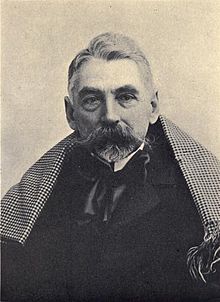
Portrait of Mallarmé, by Nadar, 1896
|
|
Today is the birthday of Stéphane Mallarmé (Paris; 18 March 1842 – 9 September 1898 Vulaines-sur-Seine), whose real name was Étienne Mallarme; poet and critic. He was a symbolist poet, and his work anticipated and inspired several revolutionary artistic schools of the early 20th century, such as Cubism, Futurism, Dadaism, and Surrealism.
On 10 August 1863, he married Maria Christina Gerhard.

In my opinion, Mallarmé is one of the French poets most difficult to translate into English. The difficulty is due in part to the complex, multilayered nature of much of his work, but also to the important role that the sound of the words, rather than their meaning, plays in his poetry. When recited in French, his poems allow alternative meanings which are not evident on reading the work on the page. For example, Mallarmé’s Sonnet en ‘-yx’ opens with the phrase ses purs ongles (‘her pure nails’), whose first syllables when spoken aloud sound very similar to the words c’est pur son (‘it’s pure sound’). The ‘pure sound’ aspect of his poetry has been the subject of musical analysis and has inspired musical compositions. These phonetic ambiguities are difficult to reproduce in a translation which must be faithful to the meaning of the words.
Mallarmé’s poetry has been the inspiration for several musical pieces, notably Claude Debussy’s Prélude à l’après-midi d’un faune (1894), a free interpretation of Mallarmé’s poem L’après-midi d’un faune (1876), which creates powerful impressions by the use of striking but isolated phrases. Maurice Ravel set Mallarmé’s poetry to music in Trois poèmes de Stéphane Mallarmé (1913). Other composers to use his poetry in song include Darius Milhaud (Chansons bas de Stéphane Mallarmé, 1917) and Pierre Boulez (Pli selon pli, 1957–62).

Un poème est un mystère dont le lecteur doit chercher la clef.
Le monde est fait pour aboutir à un beau livre.
Ecrire, c’est déjà mettre du noir sur du blanc.
Cette foule hagarde ! Elle annonce : Nous sommes la triste opacité de nos spectres futurs.
Sait-on ce que c’est qu’écrire ? Une ancienne et très vague mais jalouse pratique dont gît le sens au mystère du Coeur.
Peindre non la chose mais son effet.
Oh ! Pour faire, Seigneur, un seul de tes sourires, Combien faut-il donc de nos pleurs ?
Dire au peintre qu’il faut prendre la nature comme elle est, vaut de dire au virtuose qu’il peut s’asseoir sur le piano.
De blancs sanglots glissant sur l’azur des corolles
– C’était le jour béni de ton premier baiser.
La chair est triste, hélas! et j’ai lu tous les livres.
Si tu veux nous nous aimerons
Avec tes lèvres sans le dire
Cette rose ne l’interromps
Qu’à verser un silence pire
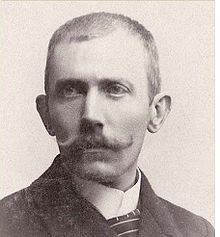
Today is the birthday of Eugène Fredrik Jansson (18 March 1862, Stockholm – 15 June 1915, Skara); painter known for his night-time land- and cityscapes dominated by shades of blue. Towards the end of his life, from about 1904, he mainly painted male nudes. The earlier of these phases has caused him to sometimes be referred to as blåmålaren, “the blue-painter”.
Gallery
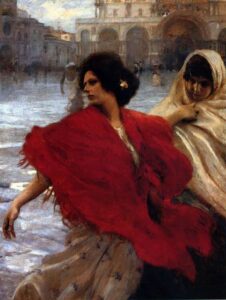
al crepuscolo
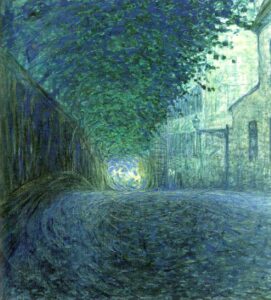
Dawn over Riddarfjärden 1899
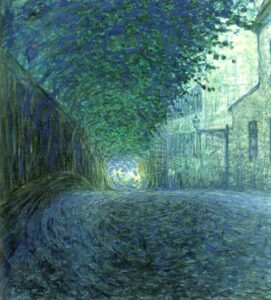
In the twilight
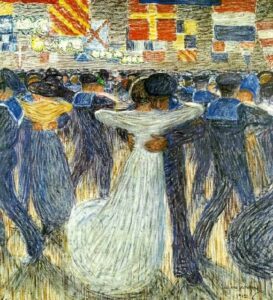
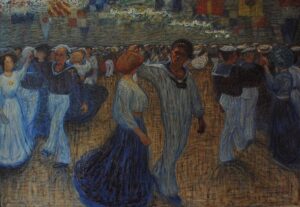
Le Bal des marins


Mac Tag

No Comments on "The Lovers’ Chronicle 18 March – yes, i hear you – verse by Stéphane Mallarmé – art by Eugène Jansson"